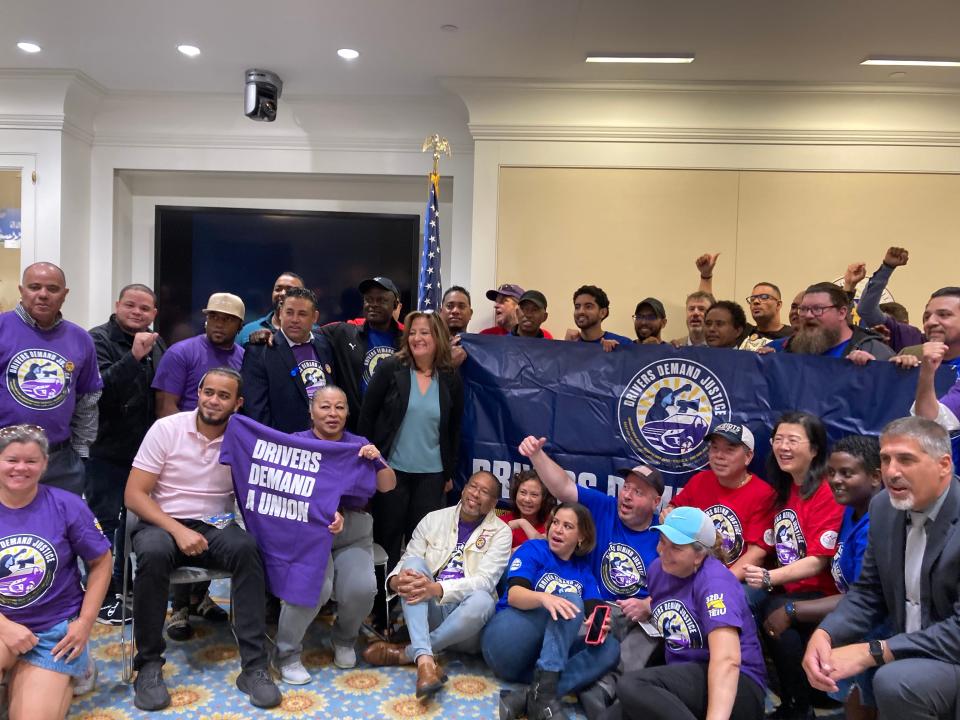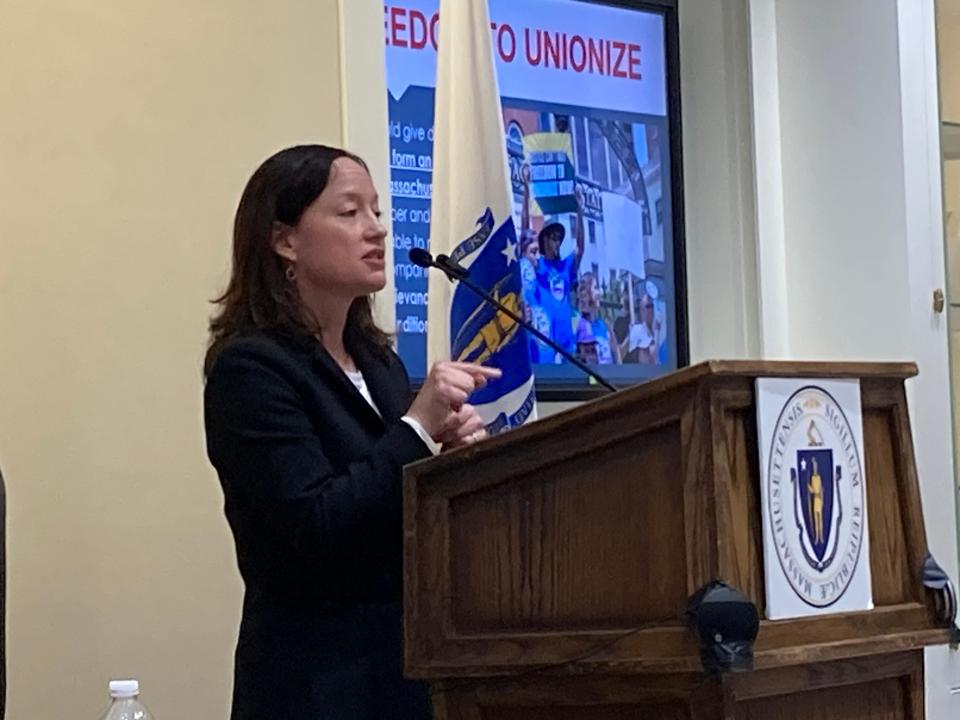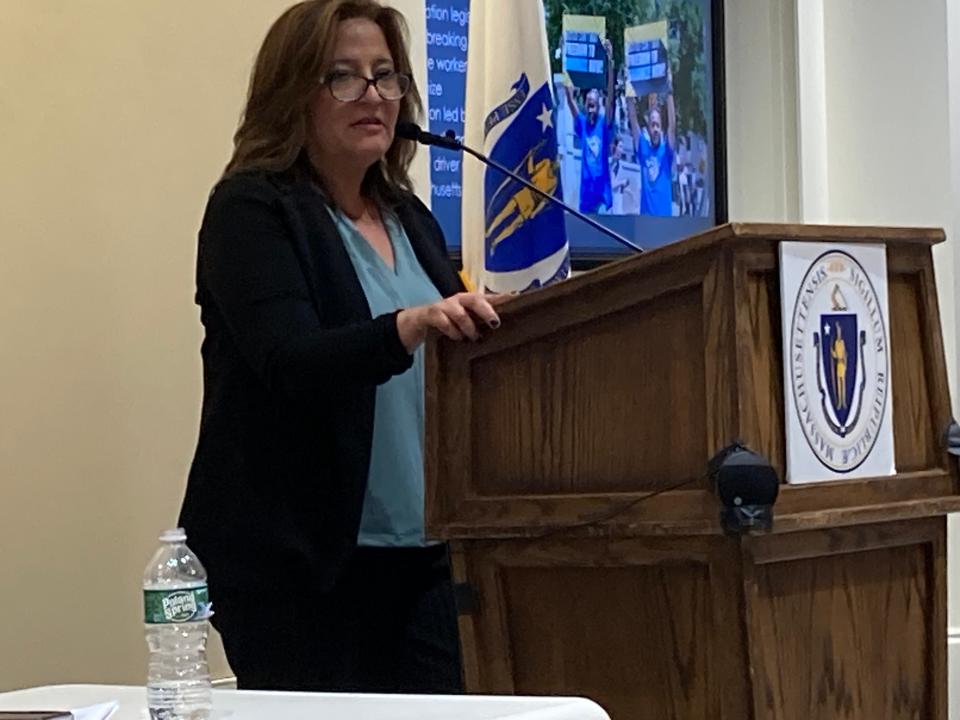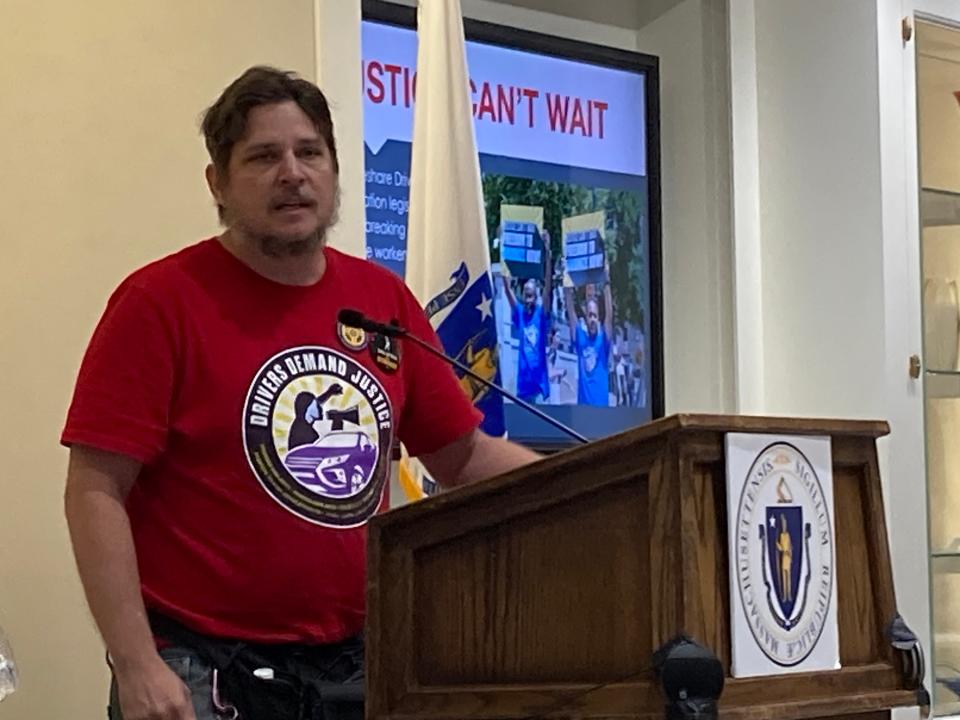Activists sponsoring bill to allow app-based workers to unionize continue on campaign
- Oops!Something went wrong.Please try again later.
BOSTON - Activists seeking unionization rights for about 200,000 Massachusetts rideshare drivers gathered at the State House Thursday as they took the next step to push the bill through the legislative process.
“We are continuing to reach out and engage with drivers on a daily basis,” said Roxana Rivera of SEIU 32BJ, one of the unions organizing the drivers with the Machinist Union District 15 and the Chinese Progressive Association. The coalition is a co-sponsor of the bill. The SEIU union was instrumental in organizing Massachusetts’ janitorial staff and airport workers.

The bill filed jointly by Sens. Jason Lewis, D-Winchester and Liz Miranda, D-Boston, would enable rideshare drivers to form a union and bargain collectively for benefits, including better working conditions, better wages, paid time off, paid sick time and even workmen’s compensation and unemployment.
The nuts and bolts of the Rideshare Drivers Justice Bill includes a minimum base wage paid during drive and wait times, per-mile payments to compensate for the cost of gas, insurance and maintenance, paid sick leave, workers' compensation in case of illness or on-the-job injuries, health care, disability insurance and unemployment insurance.
“Just because it is an app-based job does not have to mean it’s not a good job,” Rivera said. Workplace conditions have been evolving in the last decade and workplace rules and regulations have to evolve as well. The bill would modernize Massachusetts labor laws to accommodate the changing workplace, amplifying the definition. The bill would allow employees without brick-and-mortar work environments to collectively reap the benefits of unionization.
The bill would ensure workers would have the right to organize without retaliation, to bargain collectively and, new to Massachusetts, change unionization methods.
“It’s a card check process,” said Katchen Locke, an attorney with Local 32BJ SEIU. She said the new way would be an opt-in process that would bar company officials from retaliating against organizers. It would also be immediate, cutting down on a company’s advocacy for nonaffiliation. “The way it is now doesn’t work for workers. We have the opportunity to do better in Massachusetts.”

To counter the legislative measure, the Massachusetts Coalition for Independent Work, has proposed to put the issue to the voters and has filed nine versions of a ballot question that could appear on the 2024 statewide ballot. The initiative, backed by the app-based companies including Uber and Lyft, would ask voters whether drivers should be considered employees of the companies or be considered independent contractors.
Drivers backing that ballot initiative have said they need the flexibility of independence that allows them to work when they can, rather than work on fixed schedules, to continue their jobs as drivers. Some versions of the proposed ballot question filed by the Coalition for Independent Work includes some benefits including the possibility of a minimum base salary, health care stipend, earned paid sick time and occupational accident insurance.

In a countermove, the coalition backing the Rideshare Drivers Justice Bill also filed its own ballot initiative. However, Rivera said the main push is to make legislative changes that would embrace all app-based workers in the state.
On-demand, app-based rideshare transportation services have taken over that sector of the economy, said Miranda, yet the companies fail to provide job security, a living wage and benefits. "We need to ensure the same rights fit rideshare drivers that are enjoyed by other Massachusetts workers."
In his remarks, Lewis said the companies are making profits on the backs of their drivers, including people of color and immigrants.
"This is not just an economic justice issue; it's a racial justice issue," Lewis said.
In August, the state auditor weighed in. Diana DiZoglio is looking into whether classifying drivers as independent contractors is detrimental to the Massachusetts unemployment system.
A similar probe conducted by the New Jersey Attorney General and Department of Labor and Workforce Development led to a $100 million payment from Uber to the state to make up for missed contributions to the Garden State’s unemployment compensation fund. Of that amount, $22 million was paid in penalties. New Jersey has roughly 300,000 rideshare workers.
“The State Auditor’s Office is conducting an analysis to determine the impact that app-based driving and delivery companies have on taxpayers,” according to a spokesperson in DiZoglio’s office. “Equally important in our analysis are the impacts these classifications have on workers. We will certainly be examining what other states have found to see if there are tangible, quantifiable effects that we can learn from.”
The analysis was just in the beginning phases last month, but DiZoglio’s spokesperson said, “It is our hope that this report will be helpful to policymakers, those directly impacted by this classification, and all Massachusetts taxpayers.”
Drivers at the meeting Thursday claim the issue reaches beyond just a living wage and benefits. The drivers supply their own vehicles and pay for insurance, gas, tolls, maintenance. If they are injured on the job or become involved in an accident, there is no workers' compensation to tide them over while they recover.
Drivers are also stymied by the ability of app companies to unilaterally deactivate their accounts. There is no recourse to deactivation, according to the drivers. They said they are seldom told why they have been blocked from the app, nor are they allowed to defend their actions.
Many drivers noted that when they first started driving, they kept more than 60% of their fares. Now the companies increase their share of the fare while decreasing what each driver is allowed to keep.

“You’ve heard other drivers say they keep anywhere from 25% to 35% of their fares, I don’t know why the percentages change,” said Martin Pitney, explaining he keeps about 60% of his fares. Then he looked around the room at the 100 or so drivers gathered to support the legislative changes to the state’s labor laws and pointed out “the optics are unseemly.”
Pitney was one of the only white drivers in the room.
Rivera, in her remarks, noted that many of the drivers are of color, and many are immigrants.
“They are isolated, underpaid and discounted by the powers that be,” Rivera said, adding that when the union organized janitorial workers, it was told that it's an impossibility. “With this bill, they will be able to sit at the table with the company.”
Betania Gonell, a North Andover single mother who drives for both Lyft and Uber, said drivers need a voice at the table. She has been driving for six years, about 60 to 70 hours a week. Now she drives longer hours just to make what she had been earning when she was a fledgling driver.
“At the beginning, I kept 80% of my fares, now I keep between 50 and 60%,” said Gonell. What started as a job she could work and still have time to raise her family is now a job that keeps her trapped and terrorized.
“I live in fear of deactivation. There’s no process, no investigation, we need job protections,” Gonell said. While she loves her work, she needs unemployment insurance, wage protections and benefits. “We are thousands of hard-working Massachusetts residents, workers. It’s time rideshare drivers have a voice.”
Pitney also complained of the constantly changing terms and conditions that apply to drivers, many made with no notice to the workforce.
“If you don’t accept, you don’t work,” Pitney said.
This article originally appeared on Telegram & Gazette: Mass. residents to face battling ballot questions in fight over drivers

